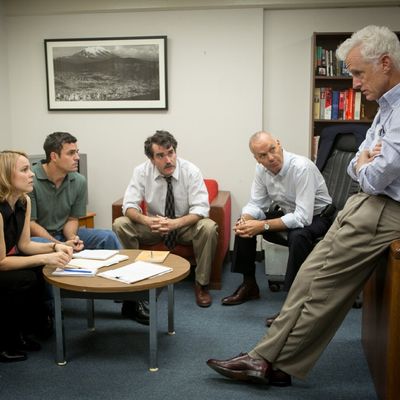
There isn’t a drop of blood in Tom McCarthy’s Spotlight, the monsters are largely offscreen, and most of the scenes turn on reporters poring over old files and pressing closed-down people to open themselves up. But this tight, relatively low-key, step-by-step procedural has a stronger impact than any horror movie. The true story of a small team of Boston reporters who, in the early 2000s, uncovered a vast number of pedophile priests and an equally vast network of criminal enablers inside and outside the Catholic church, Spotlight makes as good a case for the necessity of investigative journalism as any film since All the President’s Men. In this case, reporters were real vampire-hunters.
The title (too drab, too generic) comes from the Boston Globe’s “Spotlight” team, a handful of men and one woman who are allowed to spend months (or even years) exploring single stories. (It was rare then, and is more so now.) At first, the story looks to Spotlight’s chief, Walter “Robby” Robinson (Michael Keaton), like more trouble than it’s worth. The team is 100 percent Catholic, and even if most of them are lapsed, who wants to offend relatives, buddies, neighbors, or one’s old priest? Plus, more than half the Globe’s subscriber base is Catholic, and the last time the paper went after the church, there were picketers and mass cancellations. It takes an outsider — the new, non-Bostonian Jewish editor, Marty Baron (Liev Schreiber) — to turn up the fire, insisting Spotlight target not individuals but the institution, the system.
Baron isn’t the hero of Spotlight — it’s a supporting role. But this is the sort of film in which there’s no central protagonist. There are only reporters pulling out threads and phoning one another breathlessly (“Get this —”) as the scale of the abuse and cover-up begins to seep into their consciousness and their world is revealed as malignant. Hearty, backslapping lawyers, administrators, and church officials lean in too close and target these reporters’ feelings of belonging: Marty Baron is a Jew with an agenda of his own. He’s not from here and can leave anytime. You, on the other hand …
The offenses the church has managed to hide are rank; they smell to heaven. Priests chose lonely kids from poor, tough neighborhoods, who could be bullied into silence or would never be believed. All are damaged, some are dead. Most find the thought of spelling out what happened to them — for public consumption and even one-on one — excruciating. But the suspense comes not from whether victims will be found — they’re everywhere. It’s from the connections. Without a larger pattern, the story will come down to what the church claims, a problem with few “bad apples” rather than a disease with many causes (enforced celibacy among them) that thrives in a culture of secrecy and male privilege.
As in The Station Agent, The Visitor, and Win Win, McCarthy (who co-wrote the script with Josh Singer) creates a great space for actors to cut loose, and this one is one of the most sensational ensembles — top to bottom — in years.
Does Mark Ruffalo overdo the shlubbiness as the earnest, dogged Michael Rezendes, whom I recall from my days at the Boston Phoenix (which the character in the movie notes “no one reads”)? Yes, but whenever Ruffalo goes mano a mano with Stanley Tucci as the cranky crusading class-action lawyer Mitchell Garabedian, the hamminess is thrilling. Tucci plays Garabedian as a yappy cur who must, for legal reasons, muzzle himself around reporters, but who has such contempt for their slowness in coming to the story that — even though Rezendes is an ally — he taunts them with his tight lips. Rachel McAdams is Sacha Pfeiffer, who goes with her grandmother to Mass and palpably quails at the thought of telling the old girl that the cornerstone of her life has been corroded by child abuse and deceit. Brian D’Arcy James’s Matt Carroll discovers there’s a top-secret pedophile-rehab house on the block where he lives with his kids. How can he keep from firebombing the house — at least until the story breaks?
Schreiber underacts marvelously as the essentially private Baron; Billy Crudup nearly stops the show as a super-smooth, super-friendly, 100 percent phony lawyer for victims the church wants out of its hair fast; and Jamey Sheridan as the church’s lawyer knows how to show the demon under the human face — and the human under the demon face. Among the now-grown victims, Michael Cyril Creighton is especially heartbreaking, but only because his scenes are the longest. Every actor rises to the occasion. Len Cariou (Stephen Sondheim’s first Sweeney Todd, which can’t be a coincidence) plays Cardinal Law, who boasts to Marty Baron about his brave work in the early days of the civil-rights movement. He is now hiding in the bowels of the Vatican. I hope they hold him a seat at Spotlight’s premiere in Rome.
Two actors give Spotlight its dramatic fulcrum. As the editor overseeing the team, Ben Bradlee Jr., John Slattery anatomizes the character — Bradlee is a good man who nonetheless dreads the thought of the story going forward. Slattery shows how Bradlee’s every step comes after winning a long inner debate over the side of himself that wants to do nothing, to wish away. Michael Keaton’s Robby Robinson might be more conflicted yet, and he often looks as if carrying the whole drama on his jittery shoulders, afraid of what he’ll learn about himself and his history of nonaction. Keaton and Slattery help turn a particular tragedy into a universal one. They play men who sit in judgment on themselves.


